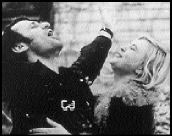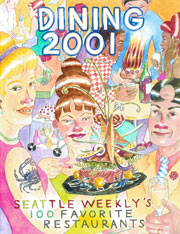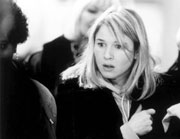LOVE AMONG THE RUINS
by Robert Clark (W.W. Norton & Co., $24.95)
WITH PROSE as still and calm as the surface of an untouched lake, Seattle author Robert Clark delivers us into the realm of his third novel, Love Among the Ruins. As with his earlier efforts (In the Deep Midwinter, Mr. White’s Confession), Clark wends his way through a specific time in history—here, Robert Kennedy’s 1968 assassination and the disastrous Democratic National Convention in Chicago that followed—and sets his characters in Minneapolis. Idealistic 17-year-old William Lowry and 16-year-old Emily Byrne, a good Catholic schoolgirl, first get to know each other through letters, until they’re suddenly caught in the throes of first passion (adolescent poetry and steamed car windows included). Both internalizing and articulating the country’s political chaos, the young lovers run away to live off the land by the northern lakes, leaving their parents to search desperately for clues to their whereabouts. Clark structures this novel very cleverly, with the first section detailing William and Emily’s tentative steps toward sexual ease, while the second part hones in on their despairing parents during the long weeks following their disappearance. Not until the third section do we come to fully understand how young, vulnerable, and naive these teens are when removed from their families, and how even the most resolutely declared love hangs in the balance between selflessness and self-preservation. Unfortunately, what should have been a starkly told tale about the intensity of a first relationship is seriously undermined by Clark’s insistence on the long-winded internal narratives each character employs when interacting with someone. Every scene is riddled with these first-person second guesses, which, particularly as the teens overcome their initial awkwardness, lessen the impact of their premeditated plan to escape the too-complicated world together.
K FALLS
by Skye Kathleen Moody (St. Martin’s Minotaur, $24.95)
SAVE THE SALMON. Drink your latte. Gripe about the Emerald City and how there’s no such thing as a native anymore. Swim in the Puget Sound every day for the sheer refreshment of it. In other words, be like Fish and Wildlife Service Agent Venus Diamond, who appears in Skye Kathleen Moody’s latest Pacific Northwest Mystery, K Falls. Ecoterrorists are on the loose, bombing dams along the Columbia; a young woman is kidnapped by the suspected ringleader. The town of Kettle Falls looks to be the locus of a lot of attention, from Venus and her colleagues, fire-walking bombers, presidential candidates, and a crazy cast of locals you’d swear got their start in Northern Exposure’s Cecily, Alaska. Moody has more fun with the rednecks and townies and the mysterious Big Guy (a.k.a. Gerald, the mastermind behind the plot to bomb the Grand Coulee when the president and his entourage arrive to give a stump speech) than she does with her own heroine. Given to gratuitous tirades about “Oz”—its increasing population of outsiders, the rain, the male-dominated office she’s subjected herself to—Venus never gets gruffly amiable enough, like Sara Paretsky’s V.I. Warshawski or Sue Grafton’s Kinsey Millhone. Instead, she’s disguising herself in colored contacts and wondering why her husband is having an affair. Well, we can kind of see where he’s coming from, but the circus of madmen and politicians and conniving wives steals her chance to shine for the reader. K Falls is slapstick mayhem, and it’s lighter than your average gumshoe series. If that’s for you, fine, but we prefer our Seattle sleuths with a bit more weather-weariness, a few more cigarettes, and some stubble.
BLUE MOUTH
by J.W. Marshall (Wood Works Press, $9)
“THERE WAS this hospital/that came into my life/at the end of an ambulance,” writes John Marshall in the first poem of his new collection, Blue Mouth, a chronicle of his being hit by a car and subsequent recovery at Harborview. In a lovely hand-set limited edition by Wood Works Press, the Open Books: A Poem Emporium co-owner tells an often unlovely story of waiting for surgery, listening to “the wad of violets on the windowsill/ whispers so what and sleep and/someone plans to call you early“; of walking the excruciating distance between his hospital bed and the nearest chair; of reassessing his own physicality and vitality. Marshall’s deliberate and declarative words put the reader into the middle of the many indignities he faces as a patient. In “Hospital Canteen: A Travelogue,” we wince along with him as he pulls his IV pole, complete with a troublesome urine bag, along for an adventure to the hospital store. He pushes familiar images into a personal perspective, so that we get to know the night nurse by the sound of her shoes (“The Night Nurse Brought Her Shoes to Work in a Paper Bag”) and the terminal cancer patient in the next bed by the way he cries softly to himself (“Better”). Inside this insulated world of the sick and the injured, there is life—Marshall’s life—and the poet’s self-awareness increases in this complex system of medicine and corridors. Once he’s out, walking around Green Lake, he knows that he’s forever affected by that time and place. He affirms, “I am part of the hospital now. Even now.” In this deceptively simple collection, Marshall’s words are glorious and humble at the same time.








